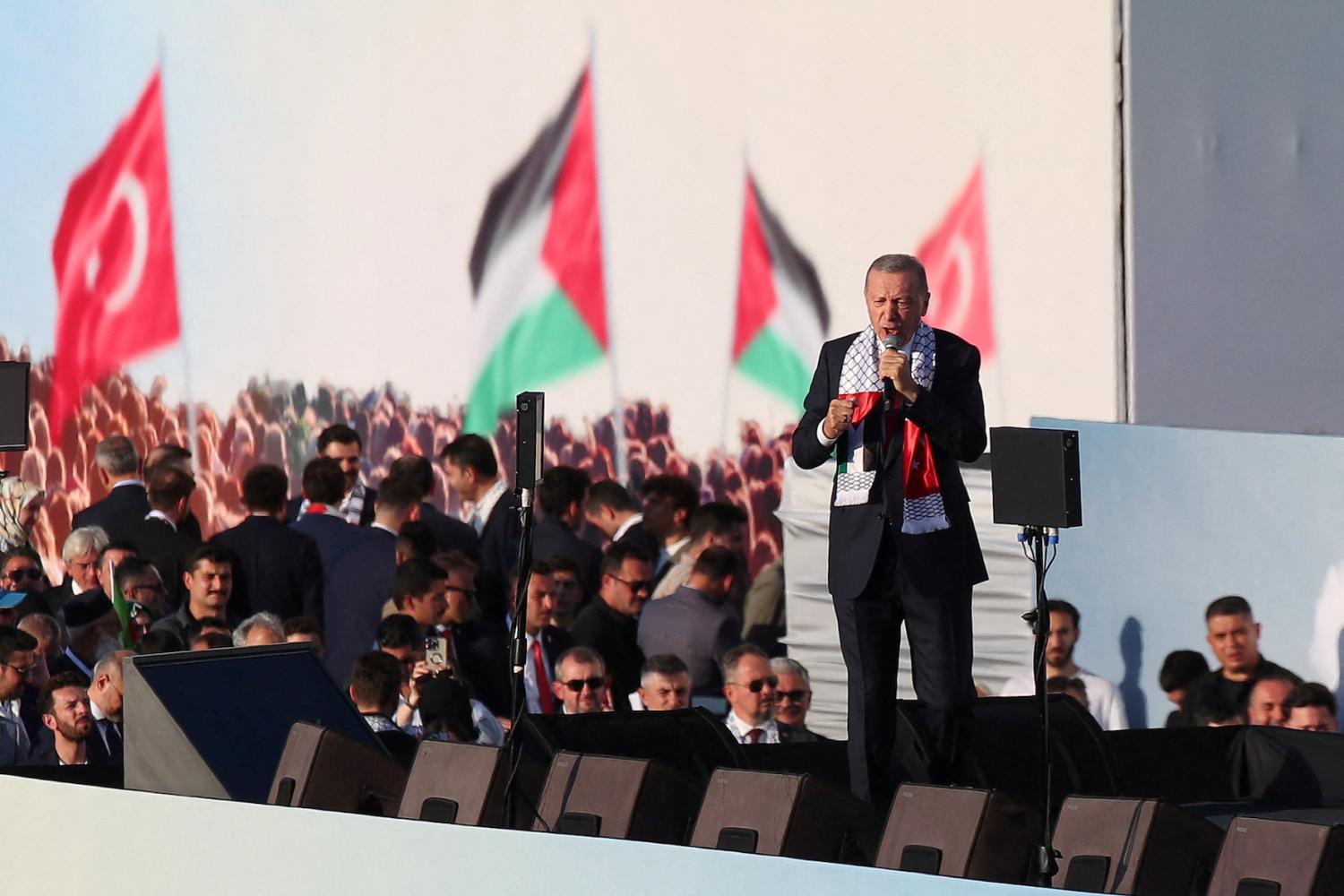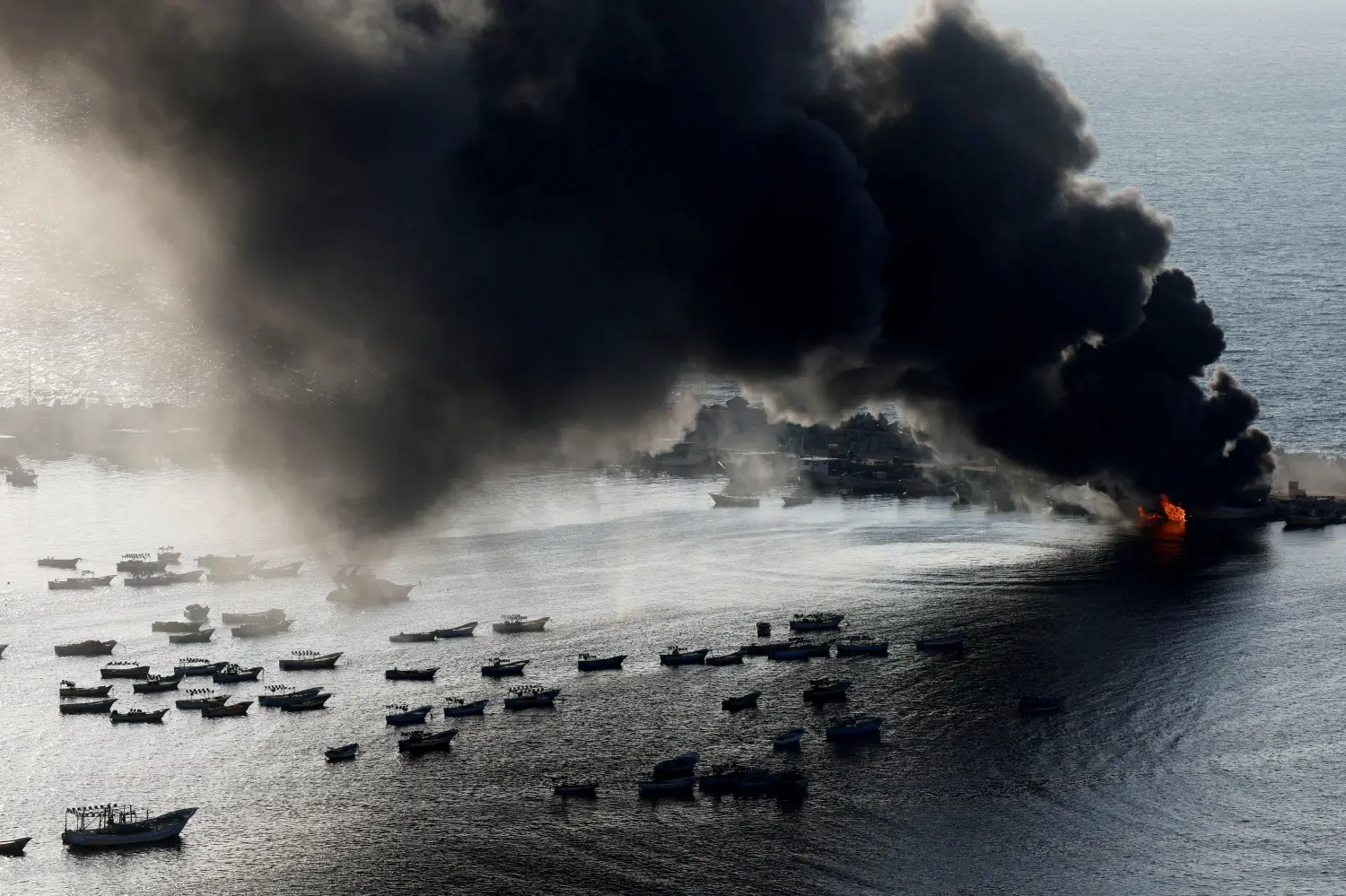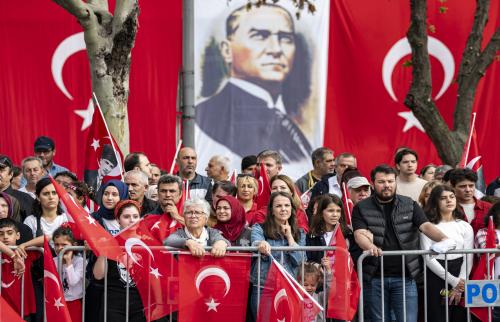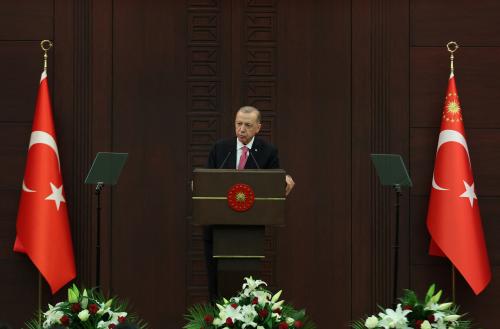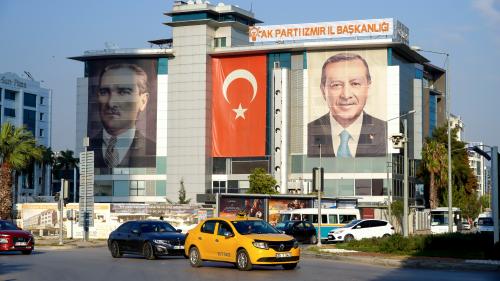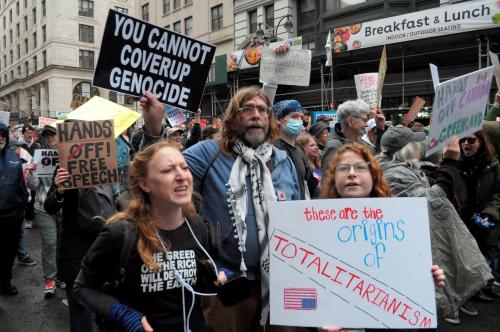Executive summary
Turkish President Recep Tayyip Erdoğan’s scathing criticisms of Israel’s ongoing military operations in the Gaza Strip are coupled with his defense of Hamas — and as such, is creating new complications for Turkey’s already difficult relations with Israel, the United States, and Europe.
Erdoğan increasingly describes the conflict in the Middle East in civilizational terms, a clash between “the crusader and the crescent,” and uses a narrative that combines neo-Ottomanism and Islamic solidarity. He has been able to convince a sizeable portion of Turkish society that the Israel-Palestinian conflict is central to Turkey’s global posture and regional ambitions.
Erdoğan’s reaction to Israel is both personal and ideological — and Ankara has the ability to amplify its criticism of Israel and the United States in the Global South and elevate the domestic pressures on Arab leaders to take a tougher position on Israel.
All of this makes Turkey a wild card and a policy challenge for the United States — one that needs to be managed and not just ignored.
Turkey wants a greater role in postwar humanitarian and peacekeeping efforts in Gaza and will maintain its criticism of Israel as long as the war continues. Erdoğan seems to have written off the government of Israeli Prime Minister Benjamin Netanyahu but is focused on playing a role in the region in the long run. The Biden administration has to identify ways to constructively manage its relations with Ankara and harness Turkey’s interest in the Palestinian cause in support of regional stability.
A declining friendship
Turkey is Israel’s oldest friend in the Middle East — and for a good part of their 74-year relationship, has been its closest one in the neighborhood.
Despite occasional spats over the years, Turkey and Israel, both non-Arab states, have been fascinated with one another and found ample strategic rationale to keep their relationship alive. Yet since Hamas’ attack on Israel on October 7 and the breakout of the deadly war in Gaza, no regional country has been as harsh in its criticism of Israel as Turkey.
A few weeks into the conflict, Erdoğan told lawmakers in his conservative Justice and Development Party (AKP), “Hamas is not a terrorist organization, it is a liberation group, ‘mujahideen’ waging a battle to protect its lands and people.”
At a massive pro-Palestinian rally in late October, the Turkish president accused Israel of behaving like a “war criminal” and committing “massacres” in Gaza and criticized the West for tolerating Israel’s excesses, as several hundred thousand Turks from Erdoğan’s conservative base waved Palestinian flags and chanted “Mehmetcik [the diminutive for Turkish soldiers] to Gaza!”
Angry at the United States for its blanket support for Israel, Erdoğan refused to meet with U.S. Secretary of State Antony Blinken during his recent tour of the Middle East, choosing instead to sip tea at the scenic Ayder highlands on Turkey’s Black Sea coast.
At recent meetings of the Arab League and the Organization of Islamic Cooperation, Turkey has led the efforts to denounce Israel, pushed to consolidate a united anti-Israel front, and lobbied for a tough communique. Ankara also supported a U.N. vote in late October calling for an immediate humanitarian truce in Gaza.
Erdoğan further declared his intention to personally lead a round of international diplomacy to build momentum on a cease-fire and pressure Western countries, notably the United States, to take a tougher line on Israel’s military operations in Gaza, which have killed over 12,000 Palestinians, the majority of whom have been civilians.
At a press conference in Berlin on November 17 with German Chancellor Olaf Scholz, Erdoğan repeated his charges against Israel, publicly, and rather undiplomatically, accused Germany and Europe of taking a softer line on Israel because of the German role in the Holocaust.
To Erdoğan, the Israel-Palestinian conflict reveals a civilizational rift between Islam and the West, and he has no uncertainty about where Turkey stands. Since the beginning of the conflict in Israel and Gaza last month, Erdoğan has been rebuking the West for approaching the issue from a “crusader vs crescent” perspective, which, in his eyes, is provoking a civilizational struggle: “[The] crusader [vs.] crescent mentality is not over. The only goal of those creating this fire is to put a hurdle before Turkey, which is the locomotive of the Turkish and Islamic world.”
Criticizing what he views as a European and U.S. “double standard” regarding Palestinian lives, he said at a recent party meeting: “13,000 people have been killed so far and where are all these heads of state, these prime ministers? [Referring to a 2015 march in Paris in protest of the terrorist attack on Charlie Hebdo] Come on, let’s organize a march. Do you not have a conscience? This is about crusader [vs.] crescent. That is how we see it.”
The Middle East’s wild card
All of this makes Turkey a “wild card” in today’s Middle East, with consequences for regional developments, Turkey’s own trajectory, and the growing divide between Turkey and its Western allies. Erdoğan’s decisions to cast the war in Israel and Gaza in civilizational terms and to blame the West for consenting to Israel’s actions is positioning Turkey, a NATO member, as a leading member of the non-aligned Global South. It is also creating new complications in Turkey’s already difficult ties with the West.
Indeed, with sizeable regional clout and a growing military footprint beyond its borders, what Turkey does and doesn’t do is relevant to the future of the region.
Ankara’s focus on the conflict and the decibel of its criticism of Israel’s military activities in Gaza can influence public opinion in other parts of the Muslim world and complicate the calculus of Arab leaders who want to protect their ties with Israel. Erdoğan’s personal engagement with middle powers like Indonesia and leaders in Central Asia and Africa is likely to consolidate anti-Israeli sentiments in the Global South and further isolate the Netanyahu government. It also broadens the rift within European societies where Muslim communities are critical of what they see as their government’s reticence on Israeli actions.
Over time, Turkey’s stance may even increase the pressure on the United States and Middle Eastern leaders to push Israel to restrain its operations in Gaza, starting with a cease-fire before eventually resuming a political process toward a settlement for Palestinians.
Turkey’s reaction to Israel’s Gaza operation and Erdoğan’s public support for Hamas have predictably led to a downturn in Ankara’s fragile relationship with Israel; both countries have recalled their ambassadors and Turkey has embarked on a self-appointed mission to hold Israel legally accountable for violations of international norms in its Gaza offensive. But Erdoğan’s harsh comments on Israel, including allegations of “genocide” and “war crimes,” have isolated Ankara from the diplomacy around hostage negotiations and humanitarian aid to Gaza. Israel would rather deal with Qatar than the firebrand Turkish leader as a backchannel to Hamas — something that frustrates Erdoğan and other Turkish officials.
Erdoğan’s reaction to the Israeli offensive in Gaza is both ideological and geopolitical — and it’s unlikely to soften as the war continues at the expense of Palestinian civilians. It is important for Washington not to let this issue torpedo its already-frail relationship with Ankara. Therefore, understanding the drivers of Turkey’s response to the current war will better prepare U.S. policymakers to identify areas where they can work with Erdoğan, or around Erdoğan, in stabilizing the Middle East.
Politics is personal
The Israeli-Palestinian conflict has long been the centerpiece of Turkey’s foreign policy, and it is consistent with Erdoğan’s focus on the idea of Turkish exceptionalism.
Erdoğan believes that restoring the glory days of his country’s imperial past is his destiny — and voters largely agree. Solidarity with the Palestinian cause has been an integral part of the AKP’s political platform since its early days. During his two decades in power, Erdoğan has succeeded in moving the Turkish establishment, and arguably its society, in line with his view on the necessity of prioritizing the Ottoman geography in Turkish foreign policy. Like Erdoğan, Ankara’s conservative AKP elites are drawn to the “civilizational rift” argument and view the Palestinian issue as both a historic mandate and a stepping-stone for Turkish influence in the Middle East.
Arguably, the Israeli-Palestinian conflict occupies a unique place in Turkey’s foreign policy that defies Erdoğan’s typical pragmatism and geopolitical balancing. In every other conflict, Erdoğan positions himself as the pragmatist, the leader who boasts of a “balanced” foreign policy to expand Turkey’s interests. But on Gaza, the Turkish leader is risking further alienation from the West by taking a strong pro-Hamas stance. So why has Erdoğan been unable to perform the type of balancing act that most Arab heads of state have undertaken — criticizing Israel but also condemning Hamas for its brutality — all the while leaning on the United States to rein in Israel’s response in Gaza? More importantly, why has Turkey taken a pro-Hamas position, despite its recent normalization drive with Israel?
The power of ideology
Turkey’s strongman and his conservative base have long viewed Hamas as a legitimate Palestinian actor, in line with their favorable views on the broader Muslim Brotherhood movement in the region. After Hamas won the elections in Gaza in 2006, Ankara invited Hamas leader Khaled Meshaal to AKP headquarters on an official visit. Since then, Turkey has advocated for Hamas’ inclusion in the Middle East peace process.
For Erdoğan, Hamas doesn’t have a representation or legitimacy problem. While Ankara has kept a line of communication open to Mahmoud Abbas and the Palestinian Authority (PA) in the West Bank, it has elevated Hamas’ status to that of the PA in its diplomatic outreach. Erdoğan has often stressed that Hamas had a popular mandate, as it had won elections in Gaza in 2006. Hamas has also developed some economic and political ties in Turkey — though they have been kept in check by Turkey’s security establishment.
Over the last decade, Turkey’s foreign policy establishment has begrudgingly learned to accommodate Erdoğan’s viewpoint on the Israel-Palestinian conflict. For Turkish officials, the idea is no longer framed in terms of what Hamas is, but how bad Israeli actions in Gaza are. In much of 2021 and 2022, Ankara had pursued normalization with Israel. Today, while still pragmatically preserving trade relations, it is ready for a cold peace.
“We don’t have any leverage over Hamas,” one Turkish diplomat told me in an interview, stressing that Turkey’s interlocutors were members of the movement’s political wing, not its powerful and elusive military branch. Ankara has at times calibrated Hamas’ access and visibility in Turkey in line with the temperature of Turkish relations with Israel — for example, Hamas’ leaders were allegedly asked to leave the country after the October 7 attacks, though Turkish officials deny this.
The ghost of Sultan Abdul Hamid II
Perhaps no other factor is more relevant in understanding Erdoğan’s impulses on the Israeli-Palestinian conflict than his fascination with the late Ottoman-era sultan, Abdul Hamid II (Abdülhamid), who reigned over the Ottoman Empire for 33 years until he was deposed in 1908 by the Young Turks. Abdülhamid is revered by Erdoğan and his generation of Turkish Islamists as “the Great Ruler” (Ulu Hakan) because of his refusal to establish a Jewish homeland in the Ottoman province of Palestine, as proposed by the World Zionist Congress in the early 20th century.
To Erdoğan and Turkish conservatives, the sultan represents the birth of pan-Islamism and the Ottoman Empire’s capacity to resist Western interventions — with parallels drawn from Erdoğan’s life. Many believe, mistakenly, that Abdülhamid was brought down by a Jewish conspiracy — and the secular republic that followed was designed to curb Turkey’s influence in the Muslim world. Had Abdülhamid not been deposed, Turkish conservatives argue, the empire would not have suffered the devastation that it did in World War I.
After two decades of AKP rule, Abdülhamid is now part of Turkish popular culture and his persona has seamlessly blended into Erdoğan’s political platform. Numerous television dramas, conferences, and government-sponsored panels on his life have turned the late Ottoman sultan into an iconic figure for Turkish conservatives. Erdoğan’s supporters draw parallels between his political story and that of Erdoğan, concluding that if Erdoğan were to leave power, Turkey, too, would collapse just like the Ottoman Empire did.
No doubt the sultan’s ghost still haunts Erdoğan’s approach to the Israeli-Palestinian conflict to this day. The Ottoman legacy over Jerusalem and Abdülhamid’s role in denying the emergence of a Jewish entity there are now part of the case for Turkey’s foreign policy toward Palestinians. To rebuild the empire, Turkish Islamists believe, one has to start where it ended.
Erdoğan regularly attends conferences on the sultan, visits his tomb, and has advised young people to watch a popular show, “The Last Emperor,” a revisionist docudrama with antisemitic overtones on the sultan’s life on Turkey’s state-owned TRT. The show adulates Abdülhamid’s attachment to the empire and its subjects against a backdrop of crudely narrated schemes from Western imperialists.
In one popular scene, a figment of the producer’s imagination, Abdülhamid yells at Baron Abraham Edmond Benjamin James de Rothschild, who is on a mission to convince the Sublime Porte to allow Jewish immigration to Jerusalem: “Jerusalem is more valuable than anything you can offer us about this world. … Jerusalem is our harem.”
In other scenes, Theodor Herzl hears similar lectures from the sultan on Jerusalem’s importance for the Ottoman Empire, intended to draw parallels with Erdoğan’s line about Turkey’s responsibility to protect Palestinians. In November, TRT also started airing a new historical drama called “Saladin: The Conqueror of Jerusalem” on the life of Saladin, the founder of the Ayyubid dynasty who spearheaded the Islamic army against the Crusaders states in the Levant, capturing Jerusalem in 1187 and establishing Muslim dominance in the region.
Turkey’s neo-Ottoman moment
All of this has changed Turkey.
As the Republic of Turkey celebrates its centennial anniversary this year, the country is a far cry from Mustafa Kemal Atatürk’s inward-looking republic which defined its place within the league of Western nations. Erdoğan’s Turkey wants a greater role on the world stage, believes the West is in decline, and holds that its destiny lies in its pursuit of an independent, non-aligned course and regional leadership.
The Turkish public has always been sensitive to the Palestinian issue but has traditionally opted for neutrality and staying out of the Middle East’s conflicts. But Erdoğan has built a new narrative that Turkish involvement with the region is an unavoidable necessity for its future great power position.
Leaders often fall victim to their own discursive success, and Erdoğan is no different. The Turkish leader has rebranded Turkey as the leader of an imaginary league of the dispossessed with a responsibility to protect the downtrodden in the Muslim world. Turkey’s self-declared mandate for a new regional order — a modern-day version of Pax Ottomanica — has been used to justify the downward cycle in its ties with the West and its expanding footprint in Libya, Iraq, Syria, and other parts of the Middle East.
At a recent Istanbul rally in support of Gaza in late October, Erdoğan said:
“We shed tears for numerous regions from Crimea to Karabakh, Bosnia to Kirkuk, Palestine to Turkistan, Afghanistan to Chechnya. … Today, some people see Gaza as a place far, far away, a place that has nothing to do with us, and even say this openly. However, a century ago, for this nation, for this country, Gaza was no different than Adana [a Turkish city]. … Gaza was an inseparable part of our homeland. … But they unfortunately separated the Turkish nation from all these lands that are as much our own as our blood, our lives and our love. Not only did they physically separate us, but they have also turned every trick in the book to uproot them [Palestine] from our minds and hearts. We must never forget the lessons we learned from the dark days when millions of our people lost their lives and millions had to leave their homes and seek refuge in Anatolia.”
The public follows Erdoğan
With local elections coming up in March 2024, the Israeli-Palestinian conflict will likely be front and center in the AKP’s campaigning. At a time when Turkey is battling economic headwinds and facing critical local elections, including a looming battle for the city of Istanbul, continued emphasis on the Palestinians’ plight helps consolidate conservative voters around the Turkish president — and his pick for the mayor of Istanbul.
The Turkish public largely mirrors Erdoğan in its criticism of Israel — and has been blaming the United States for its unequivocal support for the Netanyahu government’s military campaign in Gaza. Turkey’s information climate is consumed by the conflict and the near-constant media coverage of the horrors faced by the Palestinians remaining in Gaza.
Erdoğan has been able to shape Turkish public opinion on the issues of Palestinians’ centrality in Turkey’s global ambitions and on the legitimization of Hamas. According to new research by Metropoll, one of Turkey’s reputable polling agencies, only 30% of the public believes Hamas is a terrorist organization, while 55% agree with Erdoğan that it is not. Based on raw data that Ozer Sencar, Metropoll’s general director, provided to me in a phone interview, support for Erdoğan’s stance on the Palestinian issue hovers around 54%, with only 36% disapproving. The Turkish public also exhibits a dose of pragmatism when it comes to economic matters, with 35% saying Turkey should cut off trade with Israel and 38% opposing total decoupling.
“You don’t understand the psychology here,” a senior member of Erdoğan’s AKP told me over the phone. “My wife has been crying about Gaza for the past month now. I go home, my wife is crying. I visit my mother, and she is also crying.”
Since early October, Turkish towns have held public vigils for Palestinians in Gaza, while political parties and Islamist non-governmental organizations — like the Humanitarian Relief Organization, which organized the 2010 Turkish flotilla that sought to break the Israeli blockade of Gaza and culminated in the death of nine Turkish citizens in an Israeli raid — held protests in major cities and outside of a U.S. base in Adana. Conservative Turks and Kurds have organized protests and rallies, including sit-ins at Starbucks.
There has been a blurring of the Islamist-secular divide in support of the Palestinian cause and a legitimization of Hamas in mainstream Turkish media, now largely controlled by the government. Posters of Hamas militants went up in demonstrations in Istanbul and Ankara, and while most of the protests have been organized by Islamist groups, one secular news network reportedly pulled its reporter from the Israeli-Gaza border in response to public outcry about her description of Hamas as a “terrorist organization.”
What Turkey wants
Based on interviews and Erdoğan’s statements, one can conclude that the Turkish establishment views this as an inflection point, not a passing flare-up of the Israeli-Palestinian conflict. Ankara does not seem to believe the danger of a regional war has passed, and Erdoğan remains deeply suspicious of U.S. policy toward the region — believing, according to one senior official, that Washington’s unconditional support for Israel is more dangerous than de-escalatory. Turkey seems to be bracing itself for long-term regional turmoil.
Ankara is also frustrated about being kept out of the regional diplomatic and humanitarian efforts concerning Gaza — though some limited aid has been able to pass through the Rafah crossing via Egypt.
Since the outbreak of the war in Gaza, Ankara has sought a greater role in the mediation efforts, hostage negotiations, and discussions of humanitarian access. Turkish Foreign Minister Hakan Fidan has floated the idea of Turkey assuming a “guarantor” status for Gaza, suggesting at a meeting of Islamic countries in Riyadh, “The Muslim world should take bold decisions until a sovereign, independent, contiguous Palestine with East Jerusalem as its capital is established.” Erdoğan reiterated the call for Turkey’s guarantor status at an emergency meeting of the Arab League and the Organization of Islamic Cooperation in Saudi Arabia in mid-November.
More than any other regional state, Turkey seems eager to assume an international mandate for the future governance of Palestinians. While Qatar has been involved in hostage negotiations and Egypt in diplomacy around humanitarian access via the Rafah crossing, neither Egypt nor Qatar has the peacekeeping and humanitarian capacity that Turkey has built through its peacekeeping roles in Somalia, Afghanistan, and the Balkans, and its newly acquired administrative experience in parts of Turkish-controlled northern Syria.
There is an inherent contradiction in the Turkish position — wanting to lead the charge against the West/Israel and seeking visibility and leadership in a postwar settlement.
At a time when the Israeli government is losing the global battle over narratives, Turkish officials seem to believe that Erdoğan’s current campaign against Israel is boosting his popularity both at home and in the Muslim world. Yet Erdoğan’s strategy may have another effect: his personalization of the Israeli-Palestinian conflict with Netanyahu could allow space for Ankara to maneuver and act pragmatically in a post-Netanyahu Israeli scene.
“Netanyahu is no longer someone we can talk to. We have written him off,” Erdoğan said in early November. Brushing aside his own government’s year-long effort to boost its relations with Israel and his handshake with Israel’s prime minister in New York in September, Erdoğan seems to be ready for another cold war between Israel and Turkey. The two countries have gone through this before and, over the past decade, practiced the art of a cold peace without a rupture in relations.
In the short run, it is difficult to see Turkish-Israeli relations recovering from their current state to a point where Israel would agree to a Turkish peacekeeping role in Gaza. Currently, even Turkey’s humanitarian access to the region has been controversial. But in the long term, when Israel’s Gaza operation is over and the regional temperature cools, it is equally difficult to see how Turkey, with its track record for peacekeeping operations in the Balkans, Afghanistan, and Somalia, can be entirely frozen out of the postwar settlement in Gaza.
The United States and Turkey
During Secretary Blinken’s photo-op with Fidan in Ankara on November 6, a glass replica of Jerusalem with the Turkish flag enveloping the city was carefully placed next to Blinken. This exemplifies how, for Turkey, the Israeli-Palestinian conflict cannot be separated from its relations with the United States.
As the United States tries to grapple with multiple geopolitical flashpoints — mostly in Turkey’s neighborhood — and address long-term challenges from Russia and China, it needs to get its relationship with Turkey on a stable track. The Israel-Gaza crisis is coming at a low point in Turkish-U.S. relations and creates further acrimony between the two. The conflict will complicate U.S. efforts to stabilize ties with Turkey in the Middle East, especially in Syria, and will undoubtedly help amplify Russia and China’s opportunistic messaging on the Palestinian issue. In the absence of a U.S.-Turkey dialogue on the war in Gaza, the situation might even make it difficult to get approval from the Turkish Parliament on Sweden’s NATO accession.
But it can also go the other way, too. If Washington can find a way to constructively engage with Ankara, U.S. officials can try to convince Erdoğan to moderate his public support for Hamas. Turkey can diplomatically contribute to U.S. efforts to prevent a regional war and keep the Abraham Accords alive. In the long run, and after a period of calm and perhaps a change in government in Israel, Turkey can also be an active participant in delivering humanitarian aid to Gaza and be a facilitator of the Middle East peace process.
For a leader who has prided himself on geopolitical pragmatism, Erdoğan’s response to the resumption of violence in Israel and Gaza has been emotional, personal, and ideological. Yet it is consistent with Turkey’s foreign policy ambitions in the Middle East — and now, it is an immovable part of Erdoğan’s political story. Turkey’s strongman has been able to align the public with his views of the region and Hamas’ legitimacy. His words also resonate in the Global South, where public opinion has tilted against the West and Israel in the battle for global public opinion.
In this dangerous geopolitical moment, where Turkey stands matters a good deal — both in terms of promoting regional de-escalation and impacting Turkey’s fragile ties with the United States and Europe. Ankara is unlikely to go to war, send another flotilla to Gaza, or support Hamas militarily. However, it will keep the pressure up on Israel and other Arab states by taking a strong stance to isolate the Netanyahu government. Turkey’s anti-Israel stance will also become more difficult for the West to ignore if Ankara begins coordinating its diplomatic efforts on the Palestinian issue with other middle powers in the Global South or with Russia and China.
The Israel-Hamas conflict is almost certain to be disruptive for Turkish-U.S. bilateral relations — already burdened by mistrust, years of misalignment, and the absence of a meaningful dialogue at the leadership level between Erdoğan and President Joe Biden. Based on my discussions with Turkish officials, Erdoğan has complained about the absence of a personal relationship between himself and Biden and has recently made clear his desire for a phone call from the White House. But the Biden administration seems unwilling to engage in personal diplomacy until Turkey ratifies Sweden’s NATO accession bid.
The Biden administration needs to figure out how to include Turkey in U.S. efforts to prevent a regional war and develop a sustainable postwar settlement for Palestinians. Sooner or later, Washington also must personally engage with Turkey’s mercurial leader to talk about the region, with the hope of reaching a regional consensus to convince the Israeli government to deescalate, permit humanitarian access, and ultimately, resume its participation in a political process for Palestinians. This may not be possible while the Israeli offensive continues, but soon afterward, the issue of postwar aid and identifying legitimate and nonviolent governance options for Palestinians will have to be prioritized in Washington’s regional policy. Turkey will be important in that conversation.
But to play a role, Erdoğan has to tone down his pro-Hamas narrative. Israelis viewed the October 7 attacks as an existential threat and have no desire to engage with Hamas or allow for its governance structures to remain in Gaza. Israel will not accept a Turkish role unless Erdoğan is willing to create rhetorical and political distance from Hamas.
Biden administration officials should engage with Turkey to explain to Erdoğan and other Turkish policymakers that Ankara would be more effective in helping Palestinians in Gaza if it moderated its pro-Hamas narrative. Washington must communicate to Turkish officials that the path to a greater Turkish role in the region will eventually require a sign-off from the Jewish state.
Turkey may or may not play a role in a future postwar Gaza, depending on how Ankara handles its relations with Israel and the United States, but its verdict on the situation will matter in shaping global public opinion — as well as among Muslim communities that live in the West.
Turkey is now an important player in the Middle East, and Erdoğan has invested personal political capital in the Israeli-Palestinian conflict. He is haunted by the ghosts of the Ottoman sultans, his own ideology, and domestic Turkish sentiments. He now has a contract with Turkish society based on the idea of regional leadership, with Palestinians at the heart of this strategy. The Biden administration must try to harness that in its engagement with the region. Erdoğan will remain active on the Israeli-Palestinian conflict — and it is in the U.S. interest to involve him constructively in Gaza’s postwar reconstruction and political process, rather than to leave him outside the tent, making life harder for all involved.
-
Acknowledgements and disclosures
The author would like to thank Adam Lammon for editing and Rachel Slattery for layout.
The Brookings Institution is committed to quality, independence, and impact.
We are supported by a diverse array of funders. In line with our values and policies, each Brookings publication represents the sole views of its author(s).

